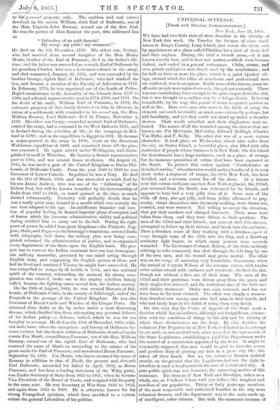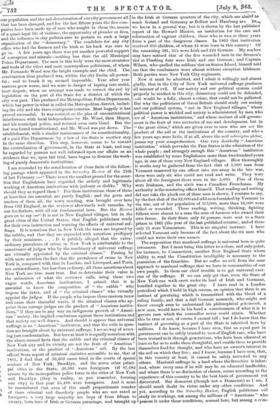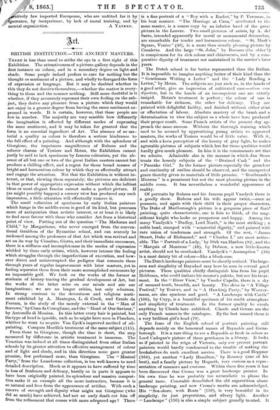UNIVERSAL SUFFRAGE.
[FROM OUR SPECIAL CORRESPONDENT.]
New York, Tune 23, 1865. WE have had two little riots of short duration in the vicinity of New York this week. On Tuesday the firemen of some small towns in King's County, Long Island, just across the river, met by appointment at a place called Flushing for a trial of their skill and their engines. During the trial a tumult arose,—it is not known exactly how, and it does not matter,—which soon became violent, and ended in a general scrimmage. Clubs, stones, and even pistols and knives were freely used by the combatants ; and for half an hour or more the place, which is a quiet Quaker vil- lage, around which the villas of merchants and professional men are scattered, was in an uproar. Beside some of the rioters, some in- offensive people were injured severely, though not seriously. There was not constabulary force enough in the place to put down the riot, but it was brought to a sudden stop by a deluge of rain. It is very remarkable, by the way, this power of water to quench passion as well as fire. Here were men who were in the habit of using the element, not much internally, or much more externally perhaps, but still familiarly, and yet they could not stand up under a thunder shower. Their wrath subsided, and their ringleaders were ar- rested. The names of all the wounded among the rioters that are known are Pat McGinnis, McCarthy, Edward McHugh, Charles Van Dyke, and F. Kelly. The other riot was of a more serious character. It took place on Wednesday, about nine miles from the city, on Staten Island, a beautiful place, also filled with villa residences of people whose business is in New York. On this island the Government has a large enclosure, used as a place of storage for the immense quantities of cotton that have been captured at the South. To protect this cotton against "Confederates on detached service," who otherwise would make a bonfire of it in very short order, a regiment of troops, the 66th New York, has been detailed, and a revenue cutter lies off the shore. At a tavern near this cotton enclosure another New York regiment, the 133rd, just returned from the South, was welcomed by its friends, and appears to have had a very jolly time of it. Some men of the 66th, off duty, also got jolly, and from jollity advanced to pug- nacity, thrust themselves into the merry-making, were thrust out, resisted, and were worsted. Not willing to accept the situation, they got their muskets and charged bayonets. Their arms were taken from them, and they were driven to their quarters. The men of the 133rd and their friends, not content with this success, attempted to follow up their victory, and break into the enclosure. Then a drunken sense of duty working with a drunken esprit de corps brought more of the 66th into the fray, and a desultory musketry fight began, in which many persons were severely wounded. The Lieutenant-Colonel, Nelson, of the 66th suddenly arriving to take command, was shot through the left lung by due of his own men, and his wound may prove mortal. The affair was on the verge of assuming very formidable dimensions, when the arrival of Captain Wilson of the revenue cutter, with twelve
sober sailors armed with cutlasses and revolvers, checked the riot, though not without a free use of their arms. The men of the 133rd and their partizans were driven away from the gates, and their ringleaders arrested, and the turbulent ones of the 66th met with similar treatment-. Order was soon restored, and has not since been in the least violated. The affair was simply a tremen- dous drunken row among men who had arms in their hands, and who had lately been in the habit of using them very freely.
On this very day the Court of Appeals of the State made a decision which has an indirect, although not insignificant, connec- tion with the condition of things in this city and its vicinity of which these disturbances are the fruit. By that decision the volunteer Fire Departinmt of New York is defeated in its attempt to set aside, as unconstitutional, a law passed at the last session of the State Legislature, establishing a paid Fire Department under the control of a commission appointed by the State. It might be reasonably supposed that men would be glad to have the severe and perilous duty of puttiug out fires ia a great city like this taken off their hands. But no, the volunteer firemen resisted stoutly, on the ground that the Legislature had not the right to interfere in such a local matter in the case of a chartered city. A pure public spirit was not, however, the animating motive of this resistance. The firemen of New York and Brooklyn, taken as a whole, are, as I believe I have told you before, the roughest and rowdiest of our population. Thirty or forty years ago members of the most respectable and cultivated families in the city were volunteer firemen, and the department was in the main made up of intelligent, sober citizens. But with the enormous increase of our population and the sad deterioration of our city government all that has been changed, and for the last fifteen years the five com- panies have been made up of men who sought in them the means of a quasi-legal life of violence, the opportunity of plunder at fires, and the influence in city politics sure to pertain to such a large organization of the "democracy." The candidate for any city office who had the firemen and the Irish at his back was sure to go in. A few years ago there was yet another powerful support of corruption and misrule—nothing less than the old Municipal Police Department. The men in this body were the mere creatures and tools of the vilest and most unscrupulous politicians, of whom Mr. Fernando Wood was the bright example and the chief. The combination thus produced was, within the city limits, all-power- ful; and to break it up seemed impossible. Year after year matters grew worse, and we were in danger of lapsing into stolid, inert despair, when an attempt was made to correct the evil by legislation on the part of the State for a district of which the city was part. This produced the Metropolitan Police Department, which has power in what is called the Metropolitan district, includ- ing the city and the three contiguous counties. Most happily it has proved successful. It was resisted on the plea of unconstitutional interference with local independence by Mr. Wood, then Mayor, and his municipal police, and resisted even unto blood. But the law was found constitutional, and Mr. Wood was put down. The establishment, with a similar maintenance of its constitutionality, of a paid Fire Department by a law of the State is another step in the same direction. This step, however, seems to be toward the centralization of government, in the State at least, and may be regarded by persons not well informed upon our affairs as an evidence that we, upon fair trial, have begun to distrust the work- ing of purely democratic institutions.
I am reminded by the consideration of these facts of the follow- ing passage which appeared in the Saturday Renew of the 25th of last February :—" There is not the smallest ground for the asser- tion that Englishmen have regarded the orderly and legitimate working of American institutions with jealousy or dislike." Why should they so regard them ? For those institutions, those of them at least that are essential, are purely English ; and the germ and nucleus of them all, the town meeting, was brought over here from Old England, as the reviewer afterwards well remarks, by our forefathers, with all our fundamental laws. But the Review goes on to say :—" It is not in New England villages, but in the great cities of the United States, that English politicians study for their own instruction and warning the effects of universal suf- frage. It is notorious that in New York the taxes are imposed by the rabble, and that they are expended with notorious profligacy by their nominees. . . . It is publicly alleged that the extra- ordinary prevalence of crime in New York is attributable to the connivance of judges who by the machinery of universal suffrage are virtually appointed by the criminal classes." Passing by with mere mention the fact that the prevalence of crime in New York is, compared with that in London, and Liverpool, and Paris, not extraordinary, but less than ordinary, all these assertions about New York are true, most true. But to determine their value in the estimation of what the reviewer calls, using those two vague words, American institutions, I submit that it is essential to know the composition of " the rabble" who impose the taxes, and of " the criminal classes" who virtually appoint the judges. If the people who impose these onerous taxes and cause their shameful waste, if the criminal classes who ap- point these corrupt judges are the product of "American institu- tions," if they are in any way an indigenous growth of " Ameri- can " society, the implied conclusions against those institutions and that society are well drawn. And should it appear that universal suffrage is an "American" institution, and that the evils in ques- tion are brought about by universal suffrage, I see no way of avert- ing just condemnation. But here at least it is equally notorious with the above-named facts that the rabble and the criminal classes of New York city and its vicinity are not the fruit of " American " institutions, or the product of " American " soil. By the last official State report of criminal statistics accessible to me, that of 1861, I find that of 36,662 eases tried in the courts of special sessions of New York, Brooklyn, and the seven other princi- pal cities in the State, 26,983 were foreigners. Of 87,682 arrests by the metropolitan police force in the cities of New York and Brooklyn (they in reality, as you remember, forming one city) in that year 65,488 were foreigners. And it must be remembered that even of this small proportionate number of these criminal and disorderly people who are not rated as foreigners, a very large majority are boys of from fifteen to twenty, born here of Irish or German parentage, and brought up in the Irish or German quarters of the city, which are aln"VI to much Ireland and Germany as Belfast and Hamburg are.
we know in a general way, but it is shown by the last published report of the Howard Mission, an institution for the care and reformation of vagrant children, those who in two or three years form a part of the dangerous classes. In 1863 that institution received 605 children, of whom 24 were born in this country ! Of the remaining 581, 315 were Irish and 224 German. My readers may have noticed that of the five wounded men in the firemen's riot at Flushing four were Irish and one German ; and Captain Wilson, who quelled the soldiers' riot on Staten Island, himself told me that the combatants were almost without exception Irishmen. Both parties were New York City regiments.
Now it must be admitted, and I admit it willingly and almost gladly, that in the City of New York universal suffrage produces all manner of evil. If our society and our political system could properly be studied in this city, democracy could not be defended, —it would be a folly, almost a crime, that could not be palliated. But why the politicians of Great Britain should study our society and our political system, "not in New England villages," where political power is wielded and society is administered by men who are of American institutions," and whose instinct of self-govern- ment is the fruit of two centuries of use and development, but in "the great cities, V which are given over to men who are not the product of the soil or the institutions of the country, and who a few years ago were little, if at all, above the serf adseriptus glebae„ passes my poor comprehension. One very decidedly "American institution" which pervades the Free States is the education of the whole people ; and strangely enough this " American " institution was established by some Englishmen more than two hundred years ago, in one of those very New England villages. How thoroughly it works may be gathered from the fact that of 5,000 men from Vermont mustered by one officer into our army in the late war, there were only six who could not read and write. They were about all the foreigners there were in the 5,000. Five of them were Irishmen, and the sixth was a Canadian Frenchman. My authority is the mustering officer himself. That reading and writing did not take the pluck out of these men is shown, I venture to say, by the fact that of the 32,000 and odd men furnished by Vermont to the war, out of her population of 315,000, more than 16,000 were killed or wounded. These reading, writing, thinking, fighting fellows were almost to a man the sons of farmers who owned their own farms. In their State only 42 persons were sent to a State prison in 1861 (the year of the last published returns), and of these only 21 were Vermonters. This is no singular instance. I have selected Vermont only because of the fact about the six men who could not write their own names.
The supposition that manhood suffrage is universal here is quite erroneous. But I must bring this letter to a close, and only point, for instance, to Connecticut, another New England State where ability to read the Constitution intelligibly is necessary to the possession of the franchise. But we suffer no evil from the near approach to manhood suffrage that we have in communities of our own people. In them our chief trouble is to get universal exer- cise of the suffrage. If we can only get that, even the State of New York can walk erect under its load of Irish and Germans, bundled together in the great city. I have read in a London periodical which I hold in high esteem, an opinion that there is an instinct of governing which is transmitted with the blood of a ruling family, and that a dull German monarch, who might not know enough even to understand his philosophical geheimrath, a new man, would have in his head a consciousness of what it is to govern men which the counsellor never could attain. Whether this be true or not, of course I cannot tell ; but I do know that the instinct of governing as a part of the State is inherited here by millions. I do know, because I have seen, that an equal part in government can be safely trusted to men of English race, who have been trained to it through generations, who have been educated at least so far as to make them thoughtful, and enable them to provide themselves food for thought, and who have an owner's interest in the soil on which they live ; and I know, because I have seen, that, in this country at least, it .cannot be safely intrusted to any others. Manhood suffrage in a land where the franchise is inher- ited, where every man if he will may be an educated landholder, and where there is no distinction of classes, seems according to the experience of this country to be the best basis of government yet discovered. But democrat (though not a Democrat) as I am, I should much doubt its virtue under any other conditions. And yet, according to the Saturday Review, English politicians will study its workings, not among the millions of " Americans " who possess it under those conditions, normal here, but among a coin-
tively few imported Europeans, who are unfitted for it by gnoranee, by inexperience, by lack of moral training, and by
































 Previous page
Previous page